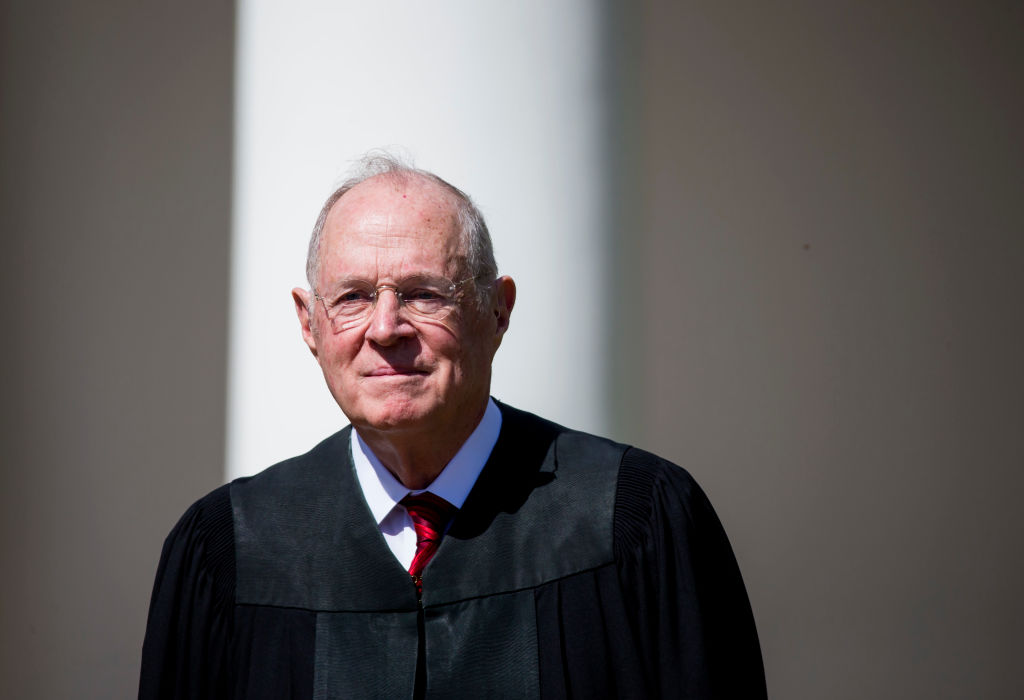To understand what has gone wrong in the American judicial appointments process, look no further than the apocalyptic hysteria which has greeted the retirement of Supreme Court justice Anthony Kennedy. Reagan appointee Kennedy has come to be seen as a ‘swing vote’ on the Court, though deciding to retire during the Trump administration has seen his reputation undergo a radical overhaul.
Amanda Marcotte at Salon writes that Kennedy ‘knows Trump is a racist authoritarian with an obvious hunger for fascist levels of power’ but would ‘still prefer Trump to nominate his replacement than a Democratic president’. MSNBC’s Chris Hayes tweets:
‘Kennedy handing his seat over to Trump is the most perfect example ever about how it is all the party of Trump. All of it. Kennedy looks down from SCOTUS and sees the man in the White House and says “Yes. Him. I want him to be the one to choose my replacement”.’
In the space of 48 hours, Kennedy has gone from revered moderate to judicial pariah. Progressives scolded conservatives for assailing ‘their own justice’ when Kennedy was busy discovering a right to same-sex marriage and they did the same when he upheld abortion rights on the grounds that liberty included ‘the right to define one’s own concept of existence, of meaning, of the universe, and of the mystery of human life’. How could anyone turn sour on the author of the Douglas Adams clause of the Constitution?
Kennedy was only respected when he was useful. Now he’s gone — and has handed Trump an opportunity to tip the Court in a more conservative direction — Kennedy is accused of surrendering ‘his seat’ to some fascist enterprise of Trumpifying American constitutional law.
It is not Kennedy’s seat and nor is it Trump’s. The president published a long-list of potential judicial nominees during the 2016 campaign, from which he selected Neil Gorsuch to replace the late Antonin Scalia. Kennedy’s successor will likely come from the same piece of paper. This list includes federal appeals court judges and renowned law professors. Serious people, seriously qualified. In the coming months we will get to know the lucky nominee as a snake-handling redneck who longs to put an altar in every classroom, an AR-15 in every teachers’ lounge, and a pipe bomb in every abortion clinic. But that is how Supreme Court appointments are debated in the US. When they go high court, they go low.
Progressives believe it is the job of the Supreme Court to protect them from the consequences of the democratic process. It’s not supposed to matter if hicks in Indiana get their guy in the White House and even more of their guys in Congress. As long as progressives have five justices, their political preferences can become constitutional guarantees and sidestep that messy ‘We the people’ business.
There are four justices on the current Court who share that view. Perhaps not the cynical political calculation but the belief that it is the Court’s job to remove from the sphere of democratic competition issues that the Constitution leaves up to the people. (In one of those annoying nuances of life, two of them – Stephen Breyer and Elena Kagan – are also the finest legal minds of their respective generations.) The constitution has nothing to say about abortion or gay marriage or the sentencing of juveniles, yet the Court has stretched that document to cover matters that a majority of justices feel it ought to cover — to comport with ‘the evolving standards of decency that mark the progress of a maturing society’.
The shrill squawks from activists about ‘reproductive rights’ and myriad other protections being under threat are really wounded cries against democracy. Democrats long ago gave up trying to win on these questions at the ballot box, knowing the Court would do the heavy-lifting for them. Now they face the prospect of having to seek the consent of the governed for their policy agenda. Thanks for nothing, Thomas Jefferson.
Conservatives have been no less corrupted by the politicisation of the judiciary. Many American right-wingers have become single-issue voters and some who should have known better cast their ballot for Donald Trump in 2016 solely on the basis that he would appoint ‘the right kind of judges’. In this bizarre world, Trump passes for a champion of constitutionalism.
That this is a terrible way to select a judiciary should be obvious to all, but the solution is less straightforward. Several proposals have been put forward in recent years, by liberals and conservatives alike, for making the confirmation process less gladiatorial. But that is a sticking plaster. Americans have to ask themselves a more fundamental question: What do they want from their Supreme Court? If the answer is a Kritarchy, a supreme parliament of nine that sits above the other two branches of government, then they will have to accept that each resignation from the Supreme Court has the potential to tip the balance of this judicial legislature in favour of the other side. They will also have to accept the strident, personal and poisonous confirmation process that comes with it.
If, however, they want a court rather than a monarchy chosen from the Harvard Alumni Association, they will have to accept responsibility for making those decisions which they have become content to let the Court handle. That means rehabilitating faith in democratic choice and respect for its outcomes, however dismaying they might be.







Comments